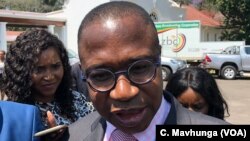MacDonald Dzirutwe
* Clearing arrears key step to towards new foreign funding
* Zimbabwe’s foreign and domestic debt at $17 billion
* Dollar woes continue, causing shortages and price increases
By MacDonald Dzirutwe
HARARE (Reuters) - The World Bank and IMF have endorsed Zimbabwe’s plan to clear $2.2 billion in arrears to international creditors, the finance minister said on Wednesday, but U.S. sanctions may still prevent fresh loans to support the rebuilding of a shattered economy
President Emmerson Mnangagwa has promised to revive the economy, pay foreign debts that the country has defaulted on since 1999 and end the international pariah status that Zimbabwe acquired under Robert Mugabe’s near four-decade rule.
But the economy remains in crisis with an acute shortage of dollars, the collapse in the value of the country’s parallel ‘bond note’ currency and many businesses struggling to operate.
Paying debt arrears could potentially open access to financing from the International Monetary Fund, World Bank and other development institutions, but the United States, which is the bank and fund’s largest member country is an obstacle.
It still maintains sanctions on Harare and is unlikely to support financing for Zimbabwe until the new government makes progress on reforms, including changing laws restricting media freedom and anti-government protests.
Finance Minister Mthuli Ncube, who is attending IMF and World Bank meetings in Bali, Indonesia, said in a statement his plans to clear the arrears to the World Bank, African Development Bank and European Investment Bank had been accepted.
“All the cooperating partners and creditors present uniformly expressed their support for Zimbabwe and its arrears clearance Road Map,” Ncube said. He did not give details and none of the creditors had an immediate comment.
Ncube said he met U.S. Deputy Assistant Secretary of the Treasury Eric Meyer who said Washington was willing to help and that Harare should see the sanctions “in a positive way”.
The lenders and Western donors in Bali urged Ncube to “judiciously” implement his two-year economic recovery programme announced last Friday, the statement said.
Ncube’s plan will see cuts in government spending and its wage bill, and privatisation of loss-making state-owned firms.
HYPERINFLATION TRAUMA
Zimbabwe, which adopted the U.S. dollar after hyperinflation left its own currency worthless in 2009, is gripped by acute shortages of cash dollars. Prices of basic goods, public taxis and medicines have risen in the last few days.
At the heart of its economic problems is a $17 billion domestic and foreign debt, a $1.8 billion trade deficit that has worsened dollar shortages and lack of confidence in the ruling party by citizens still traumatised by hyperinflation.
The economic crunch is increasing political tension after a July vote that was supposed to lay the foundation for Zimbabwe’s recovery was instead followed by turmoil that left six people dead after an army crackdown.
The latest crisis was triggered by fiscal and monetary changes announced on Oct. 1, including a 2 percent tax on money transfers and separation of cash dollars and foreign inflows from bond notes and electronic dollars, that caused the collapse of the surrogate currency on the black market.
On Wednesday, some shops and restaurants, including the local franchise of fast-food chain KFC had closed their outlets because some suppliers of goods and medicines were demanding cash dollars.
When the fiscal changes were announced, $100 in bond notes was worth $49 cash dollars but was worth only $26 on Wednesday.
In a separate statement, Ncube said the bond note and electronic dollars would remain officially pegged at 1:1 to the U.S. dollar as the government seeks to protect people’s savings. (Editing by James Macharia and Toby Chopra)




